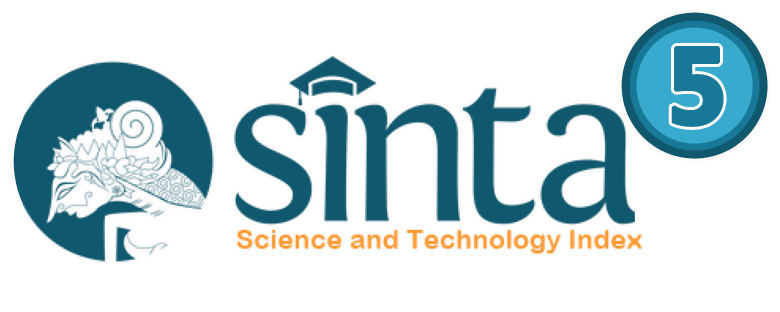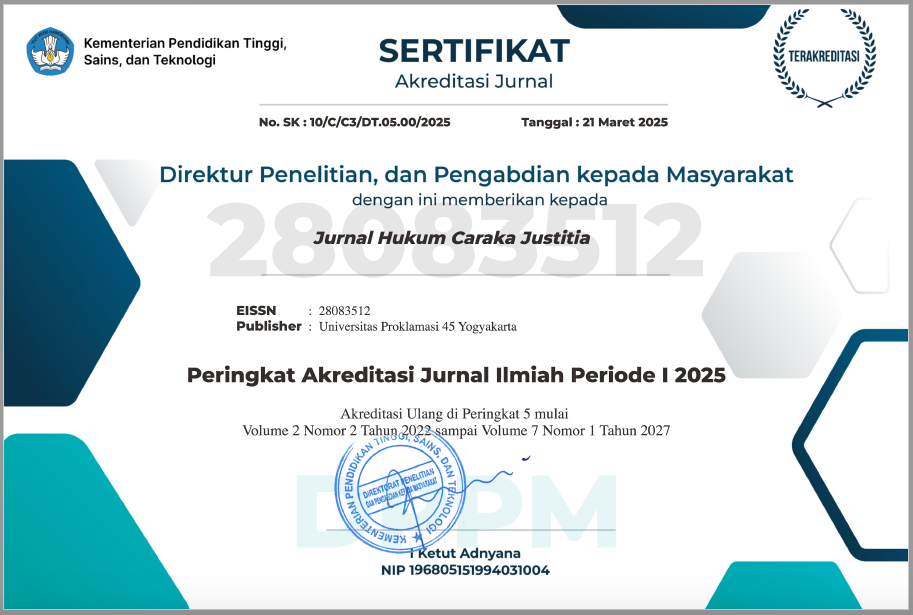Kebijakan Tentang Raperda Jogja Smart Province Pemerintah Daerah Istimewa Yogyakarta
DOI:
https://doi.org/10.30588/jhcj.v4i2.1981Keywords:
Policy, Draft Regional Regulation, Jogja Smart ProvinceAbstract
Presidential Decree Number 20 of 2006 Information and Communication Technology (ICT)-based government management known as E-Government is using information and communication technology in government processes to increase efficiency, effectiveness, transparency, and accountability in government administration. Management of government services using ICT is implementing electronic government based on ICT to improve government performance in its relations with society, the business community, and other related groups towards good and clean governance.
The research used in this research is descriptive with a qualitative approach. Meanwhile, data collection techniques use FGD techniques, observation, interviews, and documentation or literature study. Implementation of data collection methods is adjusted to the depth of information that must be explored and the availability of resources. The data taken to conduct this study consisted of primary data and secondary data. Primary data is data collected directly from the source and/or derived from direct measurements of the object of study through in-depth interviews with key figures.
The research results show that the vocabulary and concept of Jogja Smart Province have been mentioned a lot, becoming a measuring point in itself. From a normative juridical perspective, the scope and concept of a smart province already have a fairly strong legal basis. Either they are originating from central government policies or from the DIY Regional Government itself. However, several things need to be added and strengthened. Conceptually, there is a need to raise the level of regulations relating to Jogja Smart Province towards the formation of regional regulation, which begins with the drafting of a regional regulation.
References
Artikel Jurnal
Aco F. “Implementasi Smart City Dalam Mendukung Layanan Masyarakat Di Daerah Istimewa Yogyakarta”. Dinamika: Jurnal Ilmiah Ilmu Administrasi Negara 10, no. 2 (2023): 426-437. http://dx.doi.org/10.25157/dak.v10i2.11863.
Elahi, K. Q. “UNDP on Good Governance”. International Journal of Social Economics 36, no. 12 (2009): 1167-1180.
Grytsenko, E., Berdnyk, A. & Pawłowska, A. “Building a Smart Province in the EU: A Comparative Study on Regional Digitalization Strategies”. Sustainability 13, no. 8 (2021): 4364. https://doi.org/10.3390/su13084364.
Hapsari, T. & Selamat, M.H. “The Role of Information and Communication Technology in Supporting E-Government Implementation in Indonesia”. International Journal of Advanced Computer Science and Applications 10, no. 12 (2019): 230-236. https://doi.org/10.14569/IJACSA.2019.0101221.
Kusumasari, D. & Rafizan, O. “Studi Implementasi Sistem Big Data Untuk Mendukung Kebijakan Komunikasi Dan Informatika”. Jurnal Masyarakat Telematika dan Informasi 8, no. 2 (2018): 81-96.
Mutiara, D., Yuniarti, S. & Pratama, B. “Smart Governance for Smart City”. IOP Conference Series: Earth and Environmental Science 126 (2018): 1-10.
Buku
Moleong, L.J. Metode Penelitian Kualitatif. Bandung: PT. Remaja Rosdakarya, 2017.
Negara, E. S. Smart Government. Palembang: Pusat Penerbitan dan Percetakan Universitas Bina Darma Press, 2021.
Sugiyono. Metode Penelitian Kuantitatif, Kualitatif, dan R&D. Bandung: Alfabeta, 2012.
Sutopo. Metode Penelitian Kualitatif: Dasar Teori dan Penerapan dalam Penelitian. Surakarta: Sebelas Maret Press, 2006.
Laporan Penelitian
Giffinger, R., Fertner, C., Kramar, H. & Kalasek, R. “Smart cities - Ranking of European Medium-Sized Cities”. Vienna University of Technology, 2007.
Internet
United Nations Digital Library. “Definition of Basic Concepts and Terminologies in Governance and Public Administration”. https://digitallibrary.un.org/record/566603?ln=en&v=pdf (diakses 1 Oktober 2024).
Peraturan Perundang-Undangan
Perda Provinsi DIY Nomor 3 Tahun 2019 tentang Pengelolaan dan Pemanfaatan Teknologi Informasi dan Komunikasi.
Perda Provinsi DIY Nomor 5 Tahun 2011 tentang Pengelolaan dan Penyelenggaraan Pendidikan Berbasis Budaya.
Peraturan Gubernur DIY Nomor 42 Tahun 2006 tentang Blue Print Jogja Cyber Province.
Keputusan Gubernur Daerah Istimewa Yogyakarta Nomor 163 Tahun 2017 tentang Program Prioritas Pembangunan Jogja Smart Province.
Downloads
Published
How to Cite
Issue
Section
License
Copyright (c) 2024 Faizal Aco

This work is licensed under a Creative Commons Attribution 4.0 International License.
Authors who publish with JHCJ agree to the following terms:
Authors retain copyright and grant the JHCJ right of first publication with the work simultaneously licensed under a Creative Commons Attribution 4.0 International License that allows others to share (copy and redistribute the material in any medium or format) and adapt (remix, transform, and build upon the material) the work for any purpose, even commercially with an acknowledgment of the work's authorship and initial publication in JHCJ.
Authors are able to enter into separate, additional contractual arrangements for the non-exclusive distribution of the journal's published version of the work (e.g., post it to an institutional repository or publish it in a book), with an acknowledgment of its initial publication in JHCJ. Authors are permitted and encouraged to post their work online (e.g., in institutional repositories or on their website) prior to and during the submission process, as it can lead to productive exchanges, as well as earlier and greater citation of published work (See The Effect of Open Access).














